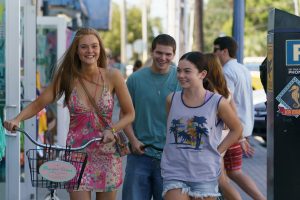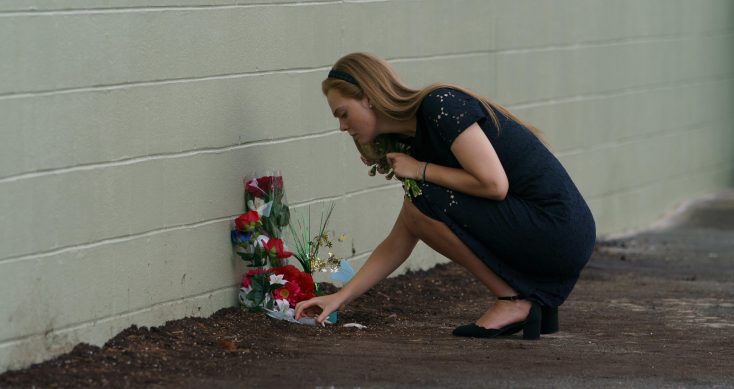
(l-r) Michelle (Elle Fanning), Conrad (Colton Ryan) and Sydney Roy (Ella Kennedy Davis) in THE GIRL FROM PLAINVILLE. ©Hulu. CR: Steve Dietl/Hulu.
By JUDY SLOANE
Front Row Features
Hulu’s new limited series “The Girl from Plainville” is inspired by the 2017 true story of Michelle Carter’s unprecedented texting-suicide case. Based on an “Esquire” article of the same name written by Jesse Barron, the series explores the relationship between Michelle (Elle Fanning, “The Great”) and Conrad Roy III (Colton Ryan, “Dear Evan Hansen”), and (SPOILER ALERT) the circumstances that led to his death and her subsequent conviction for involuntary manslaughter.
Liz Hannah and Patrick McManus co-wrote and executive-produced the series which premieres with three episodes on Hulu Tuesday March 29. Fanning, who is also an executive producer, spoke virtually with the TV Critics Association about the provocative subject of cyber-bullying and being “unbiased” in telling Michelle’s story.
Q: Can you remember when you first saw this as a news story? Can you remember your opinions at that time?
Elle Fanning: I was a bit young. I do remember it being out there and seeing her on magazine covers. I think my mom and my family was following the case and I would hear whisperings about it. I didn’t watch the case. I just could sense the headlines in the media was making things one (sided). I know, just as someone who’s interested in psychology and the human experience, there’s always an in between there. It can’t just be one thing. So when this came along, I was excited to look at it from an unbiased perspective. But at the time, I honestly I didn’t have an opinion. I was literally involved in my own texting dramas.
Q: Continuity can always be a challenge when you’re playing a role, but with this especially I would think if it wasn’t filmed in a linear way, it would have been difficult.
Fanning: This was really interesting because you had the double timelines. In every single episode, we’re going back to the past and to the present. That was just an added extra flavor that Liz and Patrick did for us.
The hair and makeup team were extraordinary for everyone to make sure that the transformations were there. All of our characters have a very identifiable transformation. Just from the way we look or what’s going on, you know exactly what timeline we’re in. It was very specific to get that right. Michelle’s look definitely evolves and changes and she grows up a lot.
Q: The TV series “Glee” is incorporated into the show. I know it’s a part of the original case, but I’m curious was there any pushback you got given the nature of this series?
Fanning: I’m so happy that Hulu helped us out there, because for a while we’re like are we even going to be able to do this scene? Can I sing this song? But, luckily, it did work out, because “Glee” throughout is so essential. (Michelle) was a big “gleek.”
Q: Michelle rehearses a song, singing alone with the character in “Glee.” What was that like to do?
Fanning: (It) was the one scene that I was so excited to do, because it summarizes so much just in that moment about this character.
I think the reason that she, and probably so many of us young people loved “Glee” or love the YA world is because you can be the star of that show. You can put yourself in that fantasy, and it’s such an escape for people who feel alone. They get to be the popular girl. They get to be that girl for how long the episode, or how long the movie, is. Our show also (incorporates) pop culture; (showing how) young people sometimes (create) this false sense of reality to feel accepted in these worlds that (they’re) not in.
Q: After being involved in this project, do you feel differently about social media?
Fanning: Yeah. I was thinking, too, about what this show says about bullying, especially social media (and) texts. You’ll see this in the show how much easier it is for people to say things behind a screen. You can create this world that isn’t real where you have no consequences for what you say, (whether) it’s comments on Instagram or texting nasty things to people. People really need to know that those words don’t go away. People are reading those words, reacting to them, taking them to heart or they’re being hurt, and tragedies can come from it; our weapon in the show are two phones.
Q: You’ve been acting since you were a little girl. What is it about acting that you love?
Fanning: I was lucky to find what I wanted to do at a very young age and still love it as much as I did. I can’t think of doing anything else. Right now I’m home. I actually have some time before I film again. I’m like, “Oh, I just want to be on a set. I want to go and immerse myself.” I don’t know what it is. I think I love the challenge of it. I love feeling terrified of just being thrown into something and making something happen.
Now that I’m a bit older, getting to produce things and see the other side of being behind the scenes, seeing the machine work and getting to have a say in that is something that I’m really interested in. I’m getting to do that and learn more, which I enjoy.





